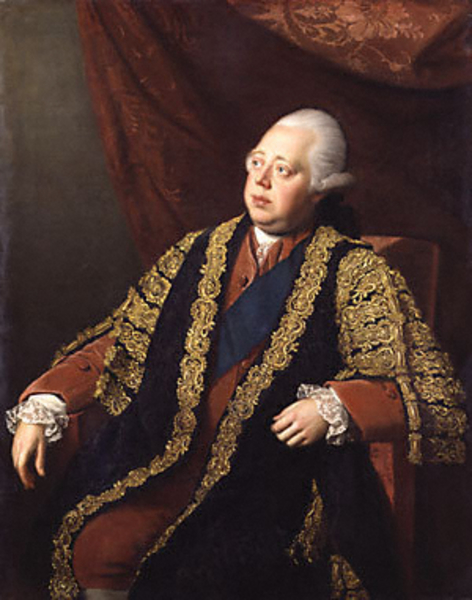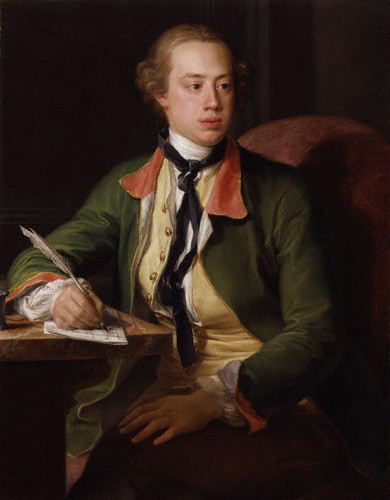<Back to Index>
- Inventor Antonio Meucci, 1808
- Painter Thomas Lawrence, 1769
- Prime Minister of the United Kingdom Frederick North, 2nd Earl of Guilford, 1732
PAGE SPONSOR


Frederick North, 2nd Earl of Guilford, KG, PC (13 April 1732 – 5 August 1792), more often known by his courtesy title, Lord North, which he used from 1752 until 1790, was Prime Minister of Great Britain from 1770 to 1782. He led Great Britain through most of the American War of Independence. He also held a number of other cabinet posts, including Home Secretary and Chancellor of the Exchequer.
Lord North was born in London on 13 April 1732, at the family house at Albemarle Street, just off Piccadilly - though he spent much of his youth at Wroxton Abbey in Oxfordshire. Lord North's strong physical resemblance to George III, suggested to his contemporaries that Prince Frederick may have been North's real father (and North the King's brother), a theory compatible with the Prince's reputation but with little real evidence. His father, the first Earl, was at the time Lord of the Bedchamber to Prince Frederick, who stood as godfather to the infant. He was descended from the 1st Earl of Sandwich and was related to Samuel Pepys and the 3rd Earl of Bute. He at times enjoyed a slightly turbulent relatonship with his father Francis North, 1st Earl of Guilford, yet they remained very close. In his early years the family was not wealthy, though their situation improved in 1735 when his father inherited property from his cousin. His mother, Lady Lucy Montagu, died in 1734. His father remarried, but his stepmother, Elizabeth North, also died in 1745, when Frederick was thirteen. One of his stepbrothers was Lord Dartmouth, who remained a close friend for life.
He was
educated at Eton
College between
1742 and 1748, and at Trinity
College,
Oxford, where in 1750 he was awarded an MA.
After
leaving Oxford,
he
travelled in Europe on the Grand
Tour with
Dartmouth, visiting Leipzig where he studied at the University
of
Leipzig. He visited Vienna, Milan,
and
Paris, returning to England in 1753. On 15
April 1754, North was elected unopposed as the Member of Parliament for
the constituency of Banbury,
at
the age of twenty two. He served as an MP from
1754 to 1790 and first joined the government as a junior Lord
of
the Treasury on
2 June 1759 during the Newcastle-Pitt coalition. He soon
developed a reputation as a good administrator, parliamentarian and was
generally liked by his colleagues. Although he initially considered
himself a Whig,
it
became obvious to many contemparies that his sympathies were largely Tory and he did not closely
align with any of the Whig Factions in Parliament. In
November 1763 he was chosen to speak for the Government concerning the
issue of John
Wilkes, a member of parliament who many felt had made a
libellous
attack of both the Prime Minister and the King in an edition of his
radical newspaper The
North
Briton. North's motion that Wilkes be expelled from the
House of Commons passed by 273 votes to 111. Wilke's expulsion took
place in his absence, as he had already fled to France following a duel. When a
government headed by the Whig magnate Lord
Rockingham came
to
power in 1765, North left his post and served for a time as a backbench
MP. He turned down an offer by Rockingham to rejoin the government,
largely out of fear with being associated with the wealthy Whig
grandees that dominated the Ministry. He came
back once more when Pitt returned to head a second government in 1766.
North was appointed Joint Paymaster
of
the Forces in
Pitt's ministry and became a Privy
Counsellor. As Pitt was constantly ill, the government was
effectively run by the Duke
of
Grafton,
with
North
as one of its most senior members.
In
December
1767, he succeeded Charles
Townshend as Chancellor
of
the Exchequer. With the resignation of the secretary of state Henry
Seymour
Conway in
early 1768, North became Leader
of
the Commons as
well, and continued to serve under Chatham's successor, the Duke
of
Grafton. When
the
Duke
of Grafton resigned as Prime
Minister, North formed a government on 28 January 1770. His
ministers and supporters tended to be known as Tories,
though
they were not a formal grouping and many had previously been Whigs.
He
took over with Britain in a triumphant state, following the Seven
Years
War, which had seen the First
British
Empire expanded
to a peak taking in vast new territories on several continents.
Circumstances forced him to keep many members of the previous cabinet
in their jobs, despite their lack of agreement with him. His
Ministry had an early success during the Falklands
Crisis in 1770
in
which they faced down a Spanish attempt to seize the Falkland islands,
nearly provoking a war. Both France and Spain had
been left unhappy by Britain's perceived dominance following the British
victory
in the Seven Years War. Spanish
forces
seized the British settlement on the Falkands and expelled the
small British garrison. This was intended as the first stage in a plan
which would then see a
Franco-Spanish
force invade Britain. However, Louis
XV did not
believe
his country was ready for war and in the face of a strong mobilisation
of the British fleet the French compelled the Spanish to back down.
Louis also dismissed Choiseul,
the
hawkish
French Chief Minister, who had advocated war and a large
French Invasion
of
Britain. The
government's prestige and popularity were enormously boosted by the
incident. They had successfully managed to drive a wedge between France
and Spain, and demonstrated the power of the Royal
Navy - although
it
was suggested by critics that this gave Lord North a level of
complacency and an incorrect belief that the European powers would not
interfere in British colonial affairs. This was contrasted with the
previous administration's failure to prevent France from annexing the Republic
of
Corsica, a British ally, during the Corsican
Crisis two years
earlier. Using his newfound popularity, North took the chance to appoint Lord
Sandwich to the
cabinet as First
Lord
of the Admiralty. Most of
his government was focused first on the growing problems with the
American colonies and later on conducting the American War
of Independence which
broke
out
in 1775, following the Battle
of
Lexington. The battles of Lexington and Concord were the result
of many taxes which Lord North was in favor of; including many of the
well known Acts. Of course, no one had known who had fired this first
shot, and still to this day has bamboozled some of the greatest minds. North deferred overall
strategy of the war to his key subordinates Lord
Germain and the
Earl of Sandwich. Despite a series of victories and the capture of New
York and Philadelphia the British were unable to
secure a decisive victory. Lord North proposed a number of legislative
measures which were supposed to punish the Bostonians for the Boston
Tea Party. These measures where known as the Coercive Acts in Britain,
while dubbed the Intolerable
Acts in the
colonies. By shutting down the inefficient Boston government and
cutting off trade, he hoped it would keep the peace and shutdown the
rebellion. But in 1778 the French allied themselves with the American
rebels, and in 1779 Spain joined the war as an ally of France. Next the Mysore and the Dutch
Republic joined
in
1780. The British found themselves fighting a global war on four
continents, without a single ally. After 1778 the British switched the
focus of their efforts to the defence of the West
Indies, as their sugar wealth made them much more valuable to
British than the Thirteen
Colonies. In 1779 Britain was faced with the prospect of a major
Franco-Spanish invasion, but the Armada
of
1779 was
ultimately unsuccessful. The
country's problems were added to by the First
League
of Armed Neutrality, which was formed to counter the British
blockade strategy, and threatened British naval supplies from the Baltic.
With
severe manpower shortages, North's government passed an act abandoning
previous statutes placing restrictions on Catholics serving
in the military. This provoked an upsurge of anti-Catholic feelings and
the formation of the Protestant
Association leading
to
the Gordon
Riots in London
in
June 1780. For around a
week the city was in the contol of the mob, until the military was
called out and martial
law imposed. North
holds the rather dubious distinction of being the first British Prime
Minister, to be forced out of office by a motion
of
no confidence, resigning on 20 March 1782 on account of the
British defeat at Yorktown the year before. In an
attempt to end the war, he proposed the Conciliation
Plan, in which he promised that Britain would eliminate all
disagreeable acts if the colonies ended the war. The colonies rejected
the plan, as their motivation had become independence. Ironically
in
1782 the war began to turn in Britain's favour again, through naval
victories, owing largely to policies adopted by Lord North and the Earl
of Sandwich. Britain was able to make a much more favourable peace in
1783 than had appeared likely at the time when North had been ousted. In April
1783, North returned to power as Home
Secretary in an
unlikely coalition with the radical Whig leader Charles
James
Fox known as
the Fox-North
Coalition under
the
nominal leadership of the Duke
of
Portland. King
George
III, who detested the radical and republican Fox, never
forgave this supposed betrayal, and North never again served in
government after the ministry fell in December 1783. One of the major
achievements of the coalition was the signing of the Treaty
of
Paris which
formally ended the American War
of Independence. The new
Prime Minister, William
Pitt
the Younger, was not expected to last long and North, a vocal
critic of his, still entertained hopes of regaining high office. In
this he was to be frustrated, as Pitt dominated the British political
scene for the next twenty years, leaving both North and Fox in the
political wilderness. He
left
his
seat in Parliament when he went blind in 1790, shortly before
succeeding his father as Earl of Guilford, spending his final years in
the House
of
Lords. He died in London and was buried at All
Saints' Church, Wroxton (Oxfordshire) near his
family home of Wroxton
Abbey. His son George
North,
Lord North, took over the constituency of Banbury, and in
1792 acceded to his father's title. Ironically, Wroxton Abbey is now
owned by Fairleigh
Dickinson
University, an American college. The now modernised abbey
currently serves as a location for American students to study abroad. Lord
North is today predominantly remembered as the Prime Minister "who lost
America". Guilford
County,
North Carolina, is
named after the father of Lord North. It was established in 1771, and
today contains the cities of Greensboro and High Point, being the third
most populous county in North Carolina. A preserved 18th century door
on display in Edinburgh Castle shows a hangman's
scaffold labelled
"Lord
Nord" carved by a prisoner captured during the American War of
Independence.